High blood pressure, medically known as hypertension, is a prevalent and potentially serious health condition affecting millions worldwide. It occurs when the force of blood against the walls of the arteries is consistently elevated, putting strain on the cardiovascular system. This silent yet formidable condition often goes unnoticed, earning it the moniker of a “silent killer.” Understanding its causes, recognizing symptoms, and exploring effective treatments are paramount for maintaining optimal health.
Many other reasons might contribute to high blood pressure, such as underlying medical disorders, lifestyle choices, and genetic predispositions. While genetics can have an impact, lifestyle factors including a high-sodium diet, inactivity, binge drinking, and smoking have a substantial impact. Furthermore, diseases including diabetes, renal illness, and obesity can make hypertension worse.
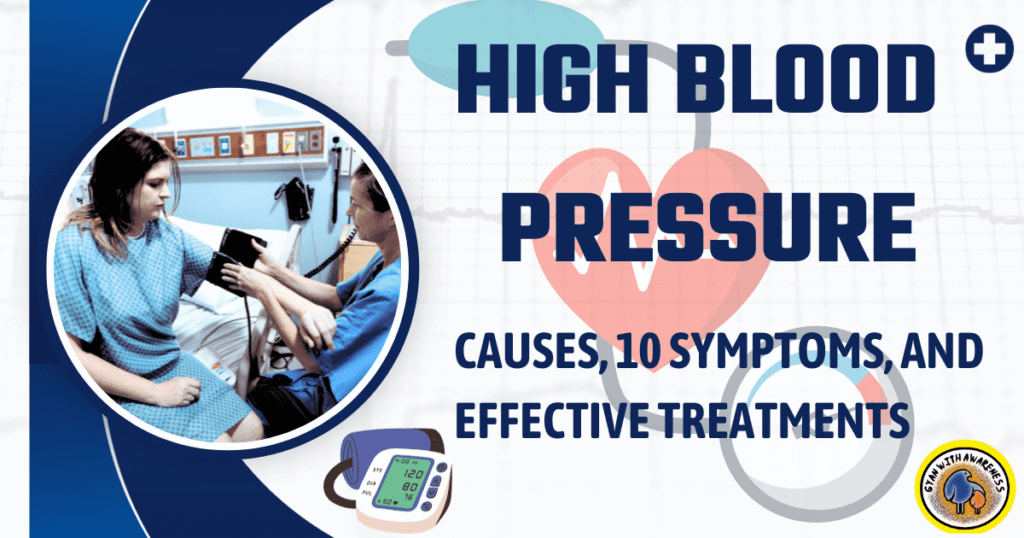
It’s important to recognize high blood pressure because, if untreated, it can cause serious problems. Headaches, shortness of breath, chest pain, and visual issues are some of the recognizable symptoms. It’s important to remember that hypertension frequently has no symptoms, which emphasizes the significance of routine blood pressure monitoring.
Fortunately, there exists a spectrum of effective treatments to manage high blood pressure and reduce associated risks. Lifestyle modifications encompassing a balanced diet, regular exercise, stress management, and limiting alcohol and sodium intake can yield significant improvements. Additionally, medications tailored to individual needs can be prescribed by healthcare professionals. By delving into the causes, symptoms, and treatments of high blood pressure, one can take proactive steps toward maintaining cardiovascular well-being.
Also Read: Leprosy: Causes, Symptoms, and 10 Effective Treatments
Measles: Causes, Symptoms, and 10 Effective Treatments
10 Optimal Fasted Cardio: Best for Weight Loss
21 Best Cardios for Weight Loss And Optimal Health
Understanding Blood Pressure:
The force that blood applies to the artery walls as the heart pumps it through the circulatory system is known as blood pressure. When the heart beats, the higher systolic pressure is measured, and when the heart is at rest between beats, the lower diastolic pressure is. A result of 120/80 mm Hg or higher is considered to be normal blood pressure. Heart disease, stroke, and kidney difficulties can all be caused by abnormal blood pressure, among other health problems. For overall well-being, it’s critical to monitor and maintain optimal blood pressure levels.
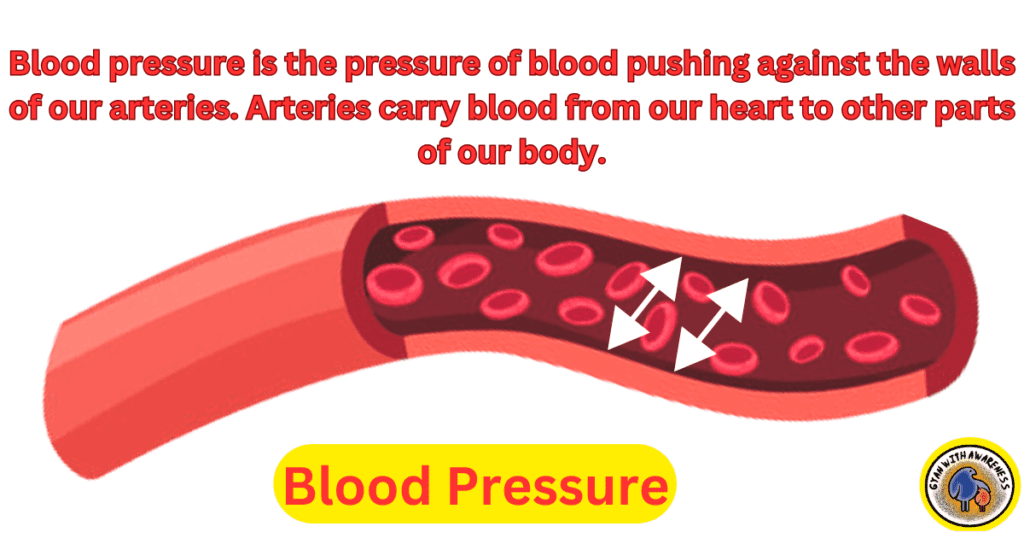
Understanding Blood Pressure Readings: Deciphering the Numbers:
Usually, blood pressure is given as two values, such as 120/80 mm Hg. These figures offer crucial details regarding the pressure exerted by blood on artery walls and shed light on cardiovascular health. Here are the meanings behind each number:
Systolic Pressure: The highest figure (for instance, 120 mm Hg) indicates the pressure experienced when the heart contracts and pumps blood into the arteries. It displays the strongest force ever applied during a heartbeat.
Diastolic Pressure: The bottom value (for example, 80 mm Hg) indicates the pressure experienced by the heart while it is at rest in between beats. When the heart is relaxed, it displays the least amount of force applied.
Signs of High Blood Pressure:
The High blood pressure symptoms are given below, and these symptoms further, will be divided into two parts high blood pressure symptoms in men and high blood pressure symptoms in women.
Back of the head headaches in particular, which are persistent or recurrent, may be a sign of high blood pressure.
Lightheadedness or Dizziness: Feeling lightheaded or dizzy, particularly when standing up fast, might be a sign of high blood pressure.
Vision Changes: High blood pressure might cause blurry vision or make it harder to focus.
Breathing Problems: Shortness of breath or breathing difficulties, even after light exercise, may indicate high blood pressure.
Chest Pain or Tightness: High blood pressure can put undue strain on the heart, causing chest pain or a tightening sensation.
Fatigue: Chronic fatigue or feeling particularly exhausted despite getting enough rest can be linked to high blood pressure.
Irregular Heartbeat: A rapid or irregular heartbeat (arrhythmia) can be a symptom of high blood pressure.
Nosebleeds: While not exclusive to high blood pressure, recurrent nosebleeds can sometimes be a sign of elevated blood pressure.
Frequent Urination: Excessive urination, especially at night (nocturia), can be linked to uncontrolled blood pressure.
Confusion or Changes in Cognitive Function: Severe hypertension can affect cognitive function, leading to confusion or difficulty concentrating.
High blood pressure symptoms in men:
1. Recurring Headaches:
Frequent and severe headaches, particularly at the back of the head, can indicate elevated blood pressure.
2. Vision Changes:
Blurred or impaired vision, along with seeing spots or experiencing difficulty focusing, may occur.
3. Chest Discomfort:
Men with high blood pressure might experience chest pain, tightness, or discomfort, especially during physical activity.
4. Breathing Too Little:
Even with minimal effort, high blood pressure can make it difficult to breathe.
5. Arrhythmia, or irregular heartbeat:
High blood pressure may be indicated by palpitations or a fluttering sensation in the chest.
6. Sex dysfunction:
Hypertension may be associated with erectile dysfunction or a decline in sexual desire.
7. Nasal bleeding:
Repeated nosebleeds aren’t always a sign of high blood pressure, but they can occasionally be.
8. Tiredness and sluggishness:
Possible symptoms include general lethargy, low energy, and persistent exhaustion.
9. Dizziness and Lightheadedness:
Feeling dizzy or lightheaded, particularly upon standing up quickly, may indicate elevated blood pressure:
10. Difficulty Concentrating:
Cognitive functions may be affected, leading to difficulty in focusing, memory lapses, or decreased mental clarity.
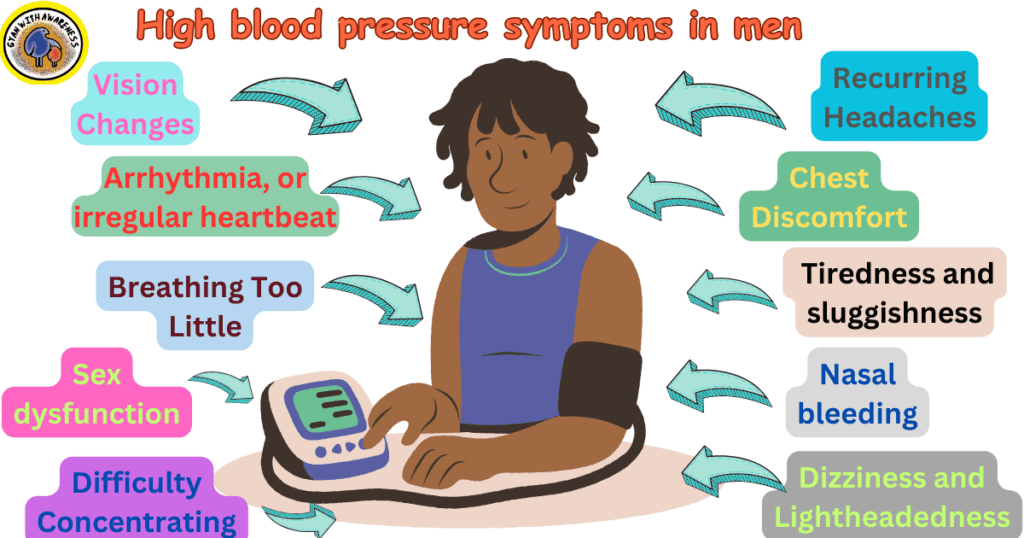
High blood pressure symptoms in women:
1. Fatigue and Weakness:
Women with high blood pressure may experience persistent fatigue and a general sense of weakness.
2. Sleep Disturbances:
Elevated blood pressure can lead to difficulty falling asleep or staying asleep throughout the night.
3. Flushed or Reddened Face:
Facial flushing, particularly around the cheeks and nose, maybe a sign of increased blood pressure.
4. Swelling in Extremities:
Edema or swelling, especially in the hands, feet, or ankles, can be indicative of hypertension.
5. Irregular Menstrual Cycle:
High blood pressure can disrupt the regularity of menstrual periods or lead to heavier flow.
6. Changes in Vision:
Blurred vision, difficulty focusing, or seeing spots may occur due to increased pressure on the blood vessels in the eyes.
7. Shortness of Breath:
Difficulty in breathing, even with minimal exertion, can be a symptom of high blood pressure.
8. Nausea or Vomiting:
Women with hypertension might experience bouts of nausea or vomiting, especially in conjunction with other symptoms.
9. Cognitive Impairment:
High blood pressure can affect cognitive function, leading to difficulty concentrating, memory lapses, or decreased mental clarity.
10. Chest Discomfort:
Women may experience chest pain, tightness, or discomfort, especially during physical activity.
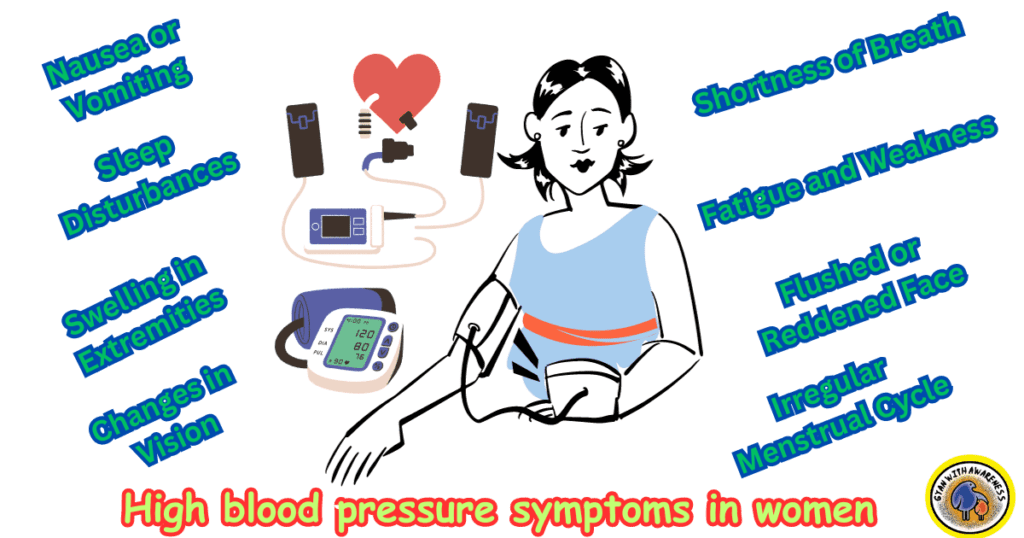
What Causes High Blood Pressure?
Genetic Predisposition: Having high blood pressure in the family increases the risk of having the condition.
Unhealthy diet: Eating processed foods, saturated fats, and lots of sodium can raise blood pressure.
Lack of Physical Activity: High blood pressure can result from a sedentary lifestyle and little exercise.
Obesity: Carrying excess weight or being obese puts additional stress on the heart, raising blood pressure.
Chronic stress and worry can raise blood pressure momentarily, and long-term stress can cause hypertension to persist.
Smoking and Tobacco Use: Tobacco’s nicotine can tighten blood vessels and speed up the heartbeat, which raises blood pressure.
Alcohol Abuse: Regular and excessive alcohol use might result in chronic hypertension.
Several Drugs: Some drugs, including nonsteroidal anti-inflammatory drugs (NSAIDs), decongestants, and a few prescription medicines, might raise blood pressure.
Health Problems at the Root: Kidney disease, diabetes, and sleep apnea are just a few of the illnesses that can cause high blood pressure.
Aging: Blood arteries naturally lose some of their flexibility and are more likely to grow rigid over time, which can raise blood pressure.
What causes high blood pressure in young adults?
Unhealthy Diet: heavy blood pressure can result from eating too many processed foods and foods heavy in sodium, as well as from eating too few fruits and vegetables.
Lack of Physical Activity: Sedentary lifestyles and little exercise raise blood pressure levels.
Excessive Stress: Long-term stress, whether it comes from a job, a personal relationship, or another source, can raise blood pressure.
A family history of hypertension raises the risk of acquiring high blood pressure due to genetic predisposition.
Obesity or Overweight: Carrying too much weight strains the heart more, raising blood pressure.
Smoking and Tobacco Use: Nicotine in tobacco products can constrict blood vessels and raise heart rate, resulting in elevated blood pressure.
Excessive Alcohol Consumption: Regular and excessive alcohol intake can lead to chronic hypertension.
Sleep Disorders: Conditions like sleep apnea, characterized by interrupted breathing during sleep, can contribute to high blood pressure.
Certain Medications or Substances: Some medications, as well as illicit drugs or certain over-the-counter products, can lead to increased blood pressure.
Underlying Health Conditions: Conditions like kidney disease, hormonal disorders, and cardiovascular issues can contribute to high blood pressure in young adults.
High blood pressure in pregnancy:
Gestational Hypertension: After the 20th week of pregnancy, some women experience gestational hypertension, which is elevated blood pressure.
Preeclampsia is a dangerous illness that can result in organ damage, high blood pressure, and protein in the urine. If not handled properly, it could be fatal.
Chronic hypertension: Pregnant women who already have high blood pressure may experience it again.
Age, obesity, diabetes, and a family history of hypertension are all factors that increase the likelihood that a pregnant woman will experience high blood pressure.
Complications for Mother: Preeclampsia, eclampsia, and HELLP syndrome are conditions that can be severe for both the mother and the unborn child and are caused by high blood pressure.
Baby complications include early birth, low birth weight, and other medical conditions.
Regular Checkups: To monitor their blood pressure and maintain correct management, pregnant women with high blood pressure need regular checkups.
Lifestyle Modifications: Dietary adjustments, consistent exercise, and stress management are essential for regulating high blood pressure when pregnant.
Treatment with medicine: In serious cases, doctors may recommend medication to decrease blood pressure and avoid problems.
Planning for Delivery: Doctors may advise either scheduling a cesarean section or inducing labor, depending on the severity of the high blood pressure and the gestational age.
High blood pressure chart pic:
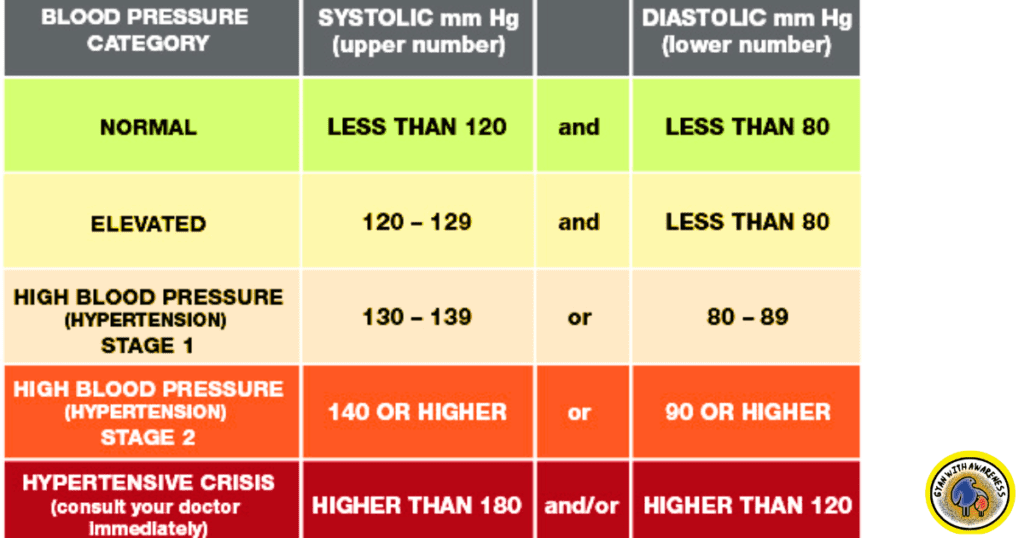
Complications Arising from High Blood Pressure:
Heart Disease: Heart diseases, such as heart attacks, heart failure, and thickening heart muscle, are greatly influenced by hypertension.
Stroke: High blood pressure can cause brain arteries to weaken or narrow, which raises the chance of having a stroke.
Kidney Damage: Healthy blood arteries support the kidneys’ function. renal disease or failure can result from high blood pressure, which also affects renal function.
eyesight Issues: High blood pressure can harm the blood vessels in the eyes, sometimes resulting in blurred or even lost eyesight.
Aneurysm: Weakened arteries may form bulges called aneurysms, which can burst and provide a life-threatening risk.
Peripheral Artery Disease (PAD): Narrowed arteries caused by high blood pressure can limit blood supply to the limbs, resulting in discomfort and possibly gangrene.
Cognitive Decline: Dementia and cognitive impairment are both at an increased risk due to chronic hypertension.
Metabolic Syndrome: High blood pressure frequently occurs in conjunction with a group of diseases (such as high cholesterol and obesity) that collectively raise the risk of developing diabetes and heart disease.
Sexual Dysfunction: Erectile dysfunction in males is a result of excessive blood pressure.
Sleep apnea: Hypertension and sleep apnea frequently coexist, with each condition perhaps making the other worse.
Emergency treatment for high blood pressure at home
Stay Calm: Encourage the person to remain calm to prevent further stress, which can exacerbate high blood pressure.
Rest and Relax: Find a quiet, comfortable place for the person to sit or lie down, ensuring proper back support.
Deep Breathing: Practice slow, deep breaths to help relax the body and reduce anxiety.
Hydration: Offer a small amount of water to drink, as dehydration can contribute to high blood pressure.
Limit Sodium Intake: Avoid foods high in sodium, as excess salt can worsen blood pressure levels.
Difference between high diastolic blood pressure and high blood pressure:
Diastolic Blood Pressure Too High:
The lower figure in a blood pressure reading is the diastolic blood pressure. It symbolizes the pressure in the arteries between heartbeats, while the heart is at rest.
When this resting blood pressure is high, the heart is working harder than it should while the body is at rest, which results in high diastolic blood pressure.
An increased diastolic pressure is one of 80 mm Hg or more.
High Blood Pressure (Hypertension):
High blood pressure, often referred to as hypertension, is a broader term encompassing both systolic and diastolic pressures.
It means that the force of blood against the arterial walls is consistently too high, even when the heart is at rest.
A typical blood pressure reading is expressed as systolic over diastolic (e.g., 120/80 mm Hg). Hypertension is diagnosed when either the systolic or diastolic reading is consistently high.
It’s classified into stages, with stage 1 hypertension having systolic pressure of 130-139 mm Hg or diastolic pressure of 80-89 mm Hg, and stage 2 hypertension having higher readings.
Also Read: Leprosy: Causes, Symptoms, and 10 Effective Treatments
Measles: Causes, Symptoms, and 10 Effective Treatments
10 Optimal Fasted Cardio: Best for Weight Loss
21 Best Cardios for Weight Loss And Optimal Health
FAQ:
What causes a low heart rate?
A low heart rate, medically known as bradycardia, can be caused by various factors. These may include certain medications, heart conditions, aging, and disruptions in the heart’s electrical signaling. Athletes may also have lower heart rates due to their well-conditioned cardiovascular systems. If bradycardia persists or is accompanied by symptoms like dizziness or fatigue, medical attention is advised.
Can anxiety cause high blood pressure?
Anxiety can indeed cause high blood pressure. The body’s stress response is triggered when a person is anxious, which causes the release of stress hormones like adrenaline. These hormones are capable of momentarily raising blood pressure. Although this is a typical and transient response, long-term worry and blood pressure elevation can eventually lead to the development of hypertension. People with anxiety must use stress-reduction strategies and get medical help if their blood pressure persistently reads high.
Does dehydration cause high blood pressure?
Dehydration can indeed cause momentary high blood pressure. Blood volume falls when the body doesn’t have enough fluid, forcing the heart to work harder to keep the blood flowing. The blood pressure may increase as a result of this. It’s crucial to understand that dehydration is not the main cause of chronic high blood pressure. Although keeping well-hydrated is important for overall health, many other factors might affect blood pressure. People who have continuously high blood pressure should consult a doctor for an accurate assessment and management.
How to reduce high blood pressure?
Adopting a diversified strategy to reduce high blood pressure will help to improve cardiovascular health overall. The following are sensible tactics:
Healthy Eating: Adopt a diet full of fresh produce, nutritious grains, lean meats, and low-fat dairy products. Limit your intake of processed foods and sodium.
Regular Exercise: Perform strength training activities in addition to 150 minutes per week of moderate to strenuous aerobic activity.
Managing your weight will help to reduce the strain on your heart and blood vessels. Achieve and keep a healthy body weight.
Using relaxation methods like yoga, meditation, or deep breathing can help you manage your stress.
Limiting alcohol and caffeine intake will help to maintain healthy blood pressure levels.
Give up smoking since it destroys blood vessels and elevates blood pressure. To maintain heart health, quitting is essential.